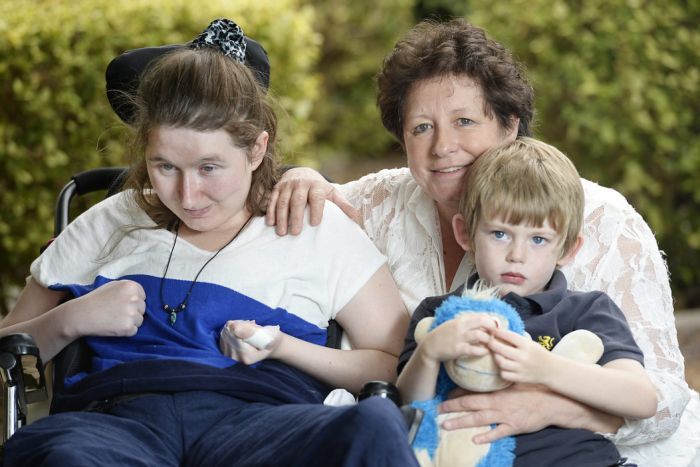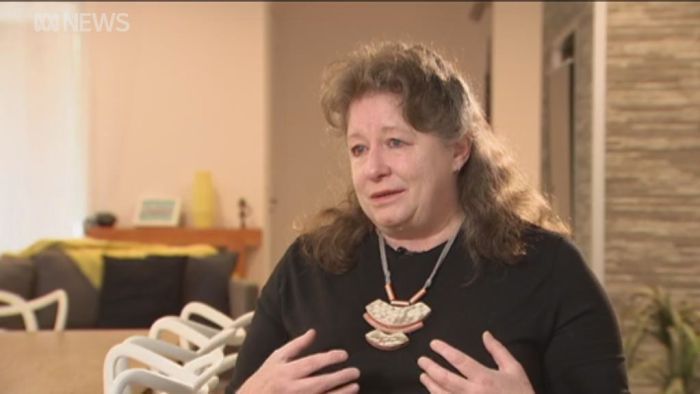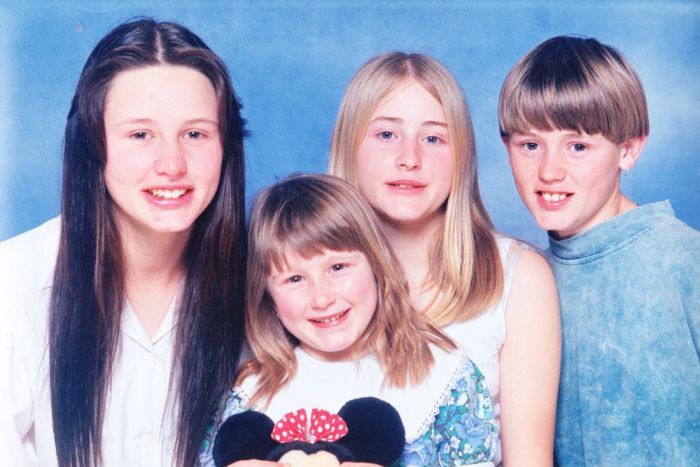'I can't live in the wreckage': Victorian road toll sparks safety summit as mum pushes for action
Updated
Chris Latimer speaks with a calmness and strength that masks her family's tragedy.
But her words cut to the bone.
"I've buried three daughters because of car crashes, and two other families have lost their sons," she says.
"This shouldn't be normal."
Sadly, the numbers show road trauma becoming increasingly so.
This year has been so bad on Victorian roads that experts met on Friday for a state government Road Safety Summit — a crisis meeting.
After a record low number of road deaths in 2018, there have been 137 so far this year. That's up from 88 at the same time last year.
It's the worst start to a year in more than a decade.
A family devastated
It has been more than two decades since Ms Latimer's daughters Wendy, 17, and Melissa, 16, were killed.
They were passengers in a vehicle being driven by Wendy's boyfriend Matthew, who also died when he hit an oncoming car while overtaking.
But Chris doesn't harbour any blame towards Matthew. Only sadness.
"He was a good kid. He was 18. He'd just got his licence," she says.
"It was just a mistake — he hadn't had his licence very long and he went to pass a car and trailer and he just didn't know how heavy his car was with four people on board."
Victorian road deaths:
- 137 people have died on Victorian roads this year
- That's up 55 per cent on the same period last year
- About three quarters of them were male
- More than 60 per cent were on rural roads
Ten years later, her son Grant was severely injured in a crash which killed the driver, his best mate.
While his arm healed, the severe psychological trauma remained.
"He'd lost his two sisters, and now he's lost his best mate and he blamed himself for not being sober and telling Marcus to slow down," Chris says.
"He was just so sad and we all were."
Twelve years later, she received an unthinkable phone call. Another of her daughters, Nicole, had been in a crash.
Her boyfriend, who was driving, clipped a sign at a roundabout and Nicole wasn't wearing a seat belt.
Chris couldn't believe it was happening again.
"There was silence all the way to the hospital, because we knew that this was pretty bad," she says.
"We pulled into the car park and I remember thinking, 'I can't open the door, 'cause if I open the door and get out, my life's going to change again'."
'Toll' not worth paying
The state's Transport Accident Commission doesn't use the term 'road toll' anymore.
A toll is the price we pay to use something, and the commission says human lives are not an acceptable cost for using the roads.
It also fails to count the thousands of people, like Nicole, whose are hospitalised due to serious injury.
Last year 8,007 people lodged Transport Accident Commission (TAC) claims after being hospitalised.
 Photo:
Nicky Latimer suffered a traumatic brain injury in a car accident. Pictured with her mum Chris and her son Blake. (Supplied: Chris Latimer)
Photo:
Nicky Latimer suffered a traumatic brain injury in a car accident. Pictured with her mum Chris and her son Blake. (Supplied: Chris Latimer)
When Chris arrived at the hospital that day, she was told Nicole had suffered a catastrophic brain injury. The equivalent of 30 strokes.
When she was eventually discharged from hospital, she was reliant on a rotating roster of round-the-clock carers and was never able to communicate properly.
So six years later, when she suffered a seizure and severe internal bleeding, it was too late to save her by the time anyone knew what was happening.
She died as a result of her injuries, adding another layer of trauma to an already traumatised family.
Chris says the ongoing effects are what people don't see on the news.
"My stepdaughter won't get a licence. She's tried to drive and her panic attacks are so severe, she can't do it," Chris says.
"My son won't have children.
"He won't pass that on because he couldn't lose another child."
Chris has found some purpose in the pain. She regularly speaks to organisations and events in a relentless push for awareness and action.
"I can't live in the wreckage," she says. "I've got to make some sort of purpose."
TAC chief's anger at 'bombs' for sale
Like many young Australians, TAC chief executive Joe Calafiore's first car was a hand-me-down from his parents.
But with young people over-represented in road trauma statistics, it's a practice he wants parents to reconsider.
"We really urge parents to think about that very deeply," he says.
A new car obviously costs more money. But to Joe, safety is not just for the very wealthy.
There are five-star safety-rated cars on sale for under $20,000.
But he warns not all new cars are necessarily safe.
The TAC chief has called on the Federal Government to ban the import of new vehicles with low safety ratings — specifically referencing Chinese manufacturer Great Wall's utes.
They cost just $19,990 brand new but come with a safety rating of two stars — the lowest of any new vehicle on Australian roads.
"Who crashes those is hardworking young tradies that go into a tree and often then have a lifelong acquired brain injury," he says.
"That makes you feel very, very sad and very angry actually, that in this day and age in Australia, that we're allowed to import products such as that.
"We shouldn't be importing cars that we know, in an accident, won't stand up to safety."
It's a message echoed by Chris Latimer.
"Don't put them in a bomb," she says.
"Put your house up for mortgage and go and get them a car that will save their life.
"We need those things in place because our young people are dying and there's no reason for it."
Crashes involving phones 'underreported'
At the summit, the TAC launched an advertising campaign about the dangers of drivers being distracted by their mobile phones.
The ad shows a driver who looks away from the road and focuses instead on his mobile phone.
A pair of hands then cover his eyes, and viewers are told: "When you're on your phone, you're driving blind."
 Video: A new TAC ad campaign is targeting drivers being distracted by their mobile phones.
(ABC News)
Video: A new TAC ad campaign is targeting drivers being distracted by their mobile phones.
(ABC News)
The TAC said in a survey of 1,742 Victorians aged between 18 and 60 years, one third said they had used their mobile phones illegally while driving.
Mr Calafiore said drivers did not take the problem seriously enough.
"What we do know is that mobile phone use is underreported in the statistics," he said.
"I was chatting to a trauma surgeon at the Alfred [hospital]. He said seven out of the eight trauma wards were people admitting to the hospital that they were on their phones.
"The statistics might be at the 10–20 per cent level — we know as road safety professionals that the proportion is much higher than that."
Road Safety Minister Jaala Pulford said the Government was considering tougher penalties for phone use while driving.
She said the current penalty of four demerit points may not be enough to deter the practice.
Topics: road, disasters-and-accidents, melbourne-3000, vic
First posted










